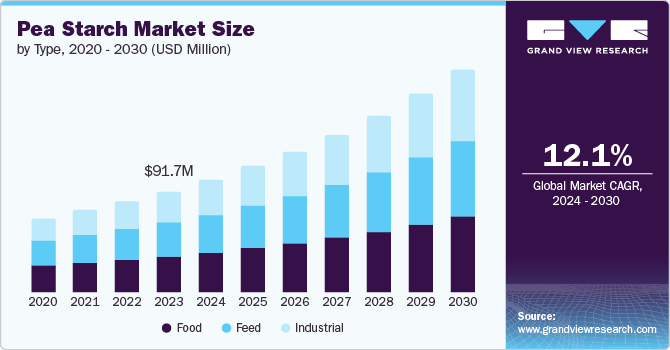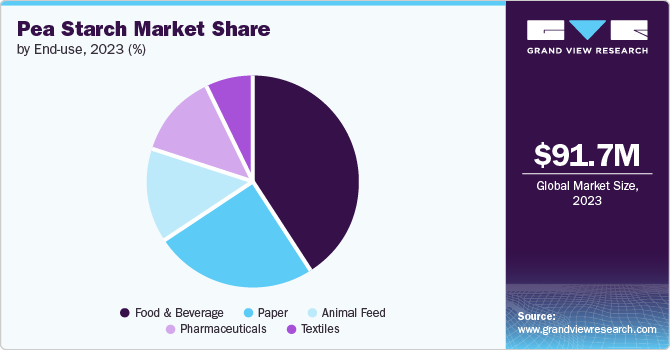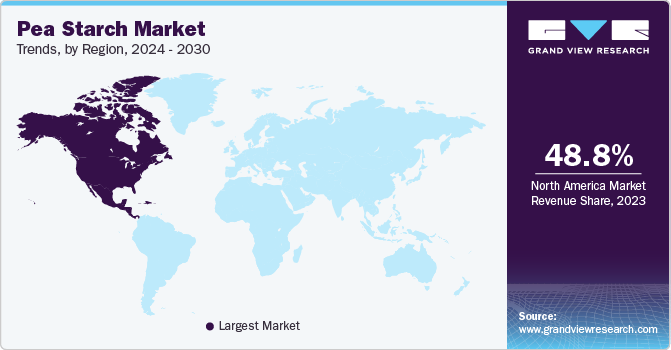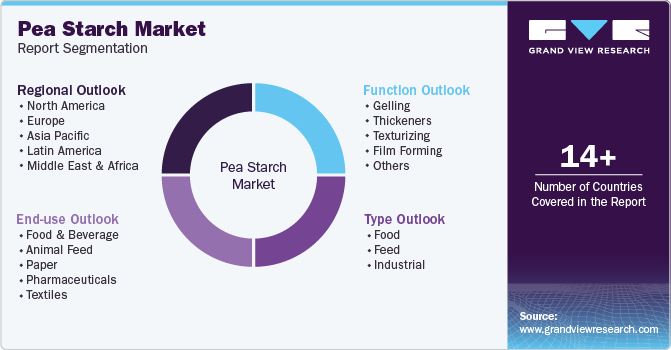Pea Starch Market Summary
The global pea starch market size was estimated at USD 91.7 million in 2023 and is projected to reach USD 203.6 million by 2030, growing at a CAGR of 12.1% from 2024 to 2030. The increasing demand for gluten-free products among consumers due to the rise in celiac disease and gluten intolerance is one of the key drivers.
Key Market Trends & Insights
- The North American pea starch market dominated in 2023.
- The U.S. pea starch market dominated North America in 2023.
- Based on type, the food segment dominated the market and accounted for a share of 35.1% in 2023.
- Based on functions, the Gelling functions accounted for the largest market revenue share of 36.3% in 2023.
- Based on end-use, the food and beverage end use segment dominated the market in 2023.
Market Size & Forecast
- 2023 Market Size: USD 91.7 Million
- 2030 Projected Market Size: USD 203.6 Million
- CAGR (2024-2030): 12.1%
- North America: Largest market in 2023
Additionally, the versatility of pea starch in various applications such as food and beverages, pet food, and pharmaceuticals is also contributing to its market growth. Furthermore, the surge in awareness about the health benefits of pea starch, such as high dietary fiber and protein content, is expected to fuel the market growth during the forecast period.

A significant market influencer is the evolving dietary patterns, including the rise of vegetarian and vegan diets driven by health concerns, ethical considerations, and the demand for sustainable food sources. With a growing number of consumers transitioning to plant-based products, there is a need for ingredients like pea starch that align with these trends and offer distinctive functional properties for food manufacturing.
The traditional methods for extracting and processing starch are being replaced by advanced technology to streamline production. Technological advancements have led to the development of new techniques for extracting and processing raw materials, opening up new opportunities for industrialists. One such method currently in use is ultrasonic extraction. As this field continues to evolve, manufacturers are constantly seeking improved extraction methods to optimize production. These advancements are expected to have a positive impact on the global pea starch market, as discussed further in this research study.
Type Insights
The food segment dominated the market and accounted for a share of 35.1% in 2023. This growth can be attributed to several driving forces, such as the unique properties of pea starch. Pea starch provides strength and body to food products, particularly in processing bakery and canned goods. Additionally, its thickening properties can significantly enhance the texture of food products.
The feed type segment is expected to grow at the fastest CAGR of 12.5% from 2024 to 2030. This growth is driven by the increasing demand for animal feeds, with pea starch emerging as a desirable option due to its nutritional value, stability during feed processing, cost-effectiveness, and alignment with health and sustainability trends as a plant-based ingredient.
Functions Insights
Gelling functions accounted for the largest market revenue share of 36.3% in 2023. The factors behind this growth are the excellent performance of pea starch as a gelling agent in the food & beverage industry for different types of products due to its enhancing consistency for products based on water. Moreover, Pea starch is also used as a gelling agent in chewing gums, jellybeans, and candies. Due to their elastic texture properties, they are also used in gummy or noodle confectioneries. This comprehensive and heavy usage of pea starch as a gelling agent increases its demands and grows the segment significantly.
The thickeners function segment is anticipated to grow at a CAGR of 7.9% from 2024 to 2030. Pea starch is heavily utilized to improve the texture of meat products due to its gelling and stabilizing properties, making it a superior product. The increased awareness of gluten and demand for clean-label ingredients have significantly boosted the market for this product.
End-use Insights
The food and beverage end use segment dominated the market in 2023. Enhanced food processing techniques, the rising trend of clean label products and plant-based products, health consciousness, and nutrition benefits increased the demand for the product and significantly grew the market.

The paper segment is expected to grow at the fastest CAGR of 12.3% from 2024 to 2030. This is driven by the natural, biodegradable properties of pea starch, which enhances paper strength and surface properties while also offering a solution for biodegradability and sustainable practices. Additionally, pea starch exhibits coating binding properties, further contributing to its appeal in the context of eco-friendly practices. These unique attributes are significantly propelling the growth of this segment.
Regional Insights
The North American pea starch market dominated in 2023. This growth can be attributed to the widespread adoption of advanced industrial applications and manufacturing technologies throughout the region.

U.S. Pea Starch Market Trends
The U.S. pea starch market dominated North America in 2023. Given the rapid and unceasing consumer lifestyle and evolving food choices in the country, pea starch has emerged as a financially feasible substitute, leading to substantial market growth.
Europe Pea Starch Market Trends
Europe pea starch market was identified as a lucrative region in 2023. Rising obesity and encouragement to lose weight have surged the demand for pea starch and increased the market significantly.
The Germany pea starch market is anticipated to experience significant growth in the coming years. This growth can be attributed to the rising influence of sports and fitness trends. The increased focus on health and wellness among consumers, mainly influenced by prominent athletes, has driven demand for pea starch as a natural and functional ingredient.
Asia Pacific Pea Starch Market Trends
Asia Pacific pea starch market is anticipated to witness significant growth in upcoming years. This is primarily due to the steady sales of the product despite price oscillations, rising need for food ingredients in multiple countries within the region, and the presence of large economies propelling market expansion.
The pea starch market in China significantly expanded in 2023, due to the increasing disposable income, rising pea production, and a growing focus on health and wellness. This led to a substantial market share for pea starch in the region.
Key Pea Starch Company Insights
Some of the key companies in the global pea starch market include Puris, Axiom Foods, AGT Foods, Sanitary, and many more. Organizations are focusing on increasing their customer base to gain a competitive edge in the industry. Therefore, key players are taking several strategic initiatives, such as mergers and acquisitions and partnerships with other major companies.
Key Pea Starch Companies:
The following are the leading companies in the pea starch market. These companies collectively hold the largest market share and dictate industry trends.
- Axiom Foods, Inc.
- Dakota Ingredients
- AGT Food and Ingredients Inc.
- Puris.
- Vestkorn
- Roquette Frères.
- Sanstar Limited
- Emsland Group
- Nutri-Pea
- Aminola
Recent Developments
-
In May 2024, Roquette introduced the LYCAGEL/Flex hydroxypropyl pea starch premix designed specifically for nutraceutical and pharmaceutical softgel capsules. This new product aims to optimize customizable formulations for end users and offers additional benefits.
-
In June 2024, Bunge entered into a collaborative agreement with Golden Fields, a leading European agricultural company specializing in the dry milling peas and faba beans. Golden Fields has constructed a dedicated new production facility in Liepaja, Latvia, which will operate exclusively to supply Bunge with these novel protein concentrates.
Pea Starch Market Report Scope
|
Report Attribute
|
Details
|
|
Market size value in 2024
|
USD 102.4 million
|
|
Revenue forecast in 2030
|
USD 203.6 million
|
|
Growth rate
|
CAGR of 12.1% from 2024 to 2030
|
|
Base year for estimation
|
2023
|
|
Historical data
|
2018 - 2022
|
|
Forecast period
|
2024 - 2030
|
|
Quantitative units
|
Revenue in USD million and CAGR from 2024 to 2030
|
|
Report coverage
|
Revenue forecast, company ranking, competitive landscape, growth factors, and trends
|
|
Segments covered
|
Type, function, end-use, region
|
|
Regional scope
|
North America, Europe, Asia Pacific, Latin America, MEA
|
|
Country scope
|
U.S., Canada, Mexico, Germany, UK, France, Italy, Spain, China, Japan, India, South Korea, Australia & New Zealand, Brazil, Argentina, UAE, South Africa
|
|
Key companies profiled
|
Axiom Foods, Inc.; Dakota Ingredients; AGT Food and Ingredients Inc.; Puris.; Vestkorn; Roquette Frères.; Sanstar Limited; Emsland Group; Nutri-Pea.; Aminola
|
|
Customization scope
|
Free report customization (equivalent up to 8 analysts working days) with purchase. Addition or alteration to country, regional & segment scope.
|
|
Pricing and purchase options
|
Avail customized purchase options to meet your exact research needs. Explore purchase options
|
Global Pea Starch Market Report Segmentation
This report forecasts revenue growth at global, regional, and country levels and provides an analysis of the latest industry trends in each of the sub-segments from 2018 to 2030. For this study, Grand View Research has segmented the global pea starch market report based on type, function, end-use, and region.

-
Type Outlook (Revenue, USD Million, 2018 - 2030)
-
Function Outlook (Revenue, USD Million, 2018 - 2030)
-
Gelling
-
Thickeners
-
Texturizing
-
Film Forming
-
Others
-
End-use Outlook (Revenue, USD Million, 2018 - 2030)
-
Food & Beverage
-
Animal Feed
-
Paper
-
Pharmaceuticals
-
Textiles
-
Regional Outlook (Revenue, USD Million, 2018 - 2030)















